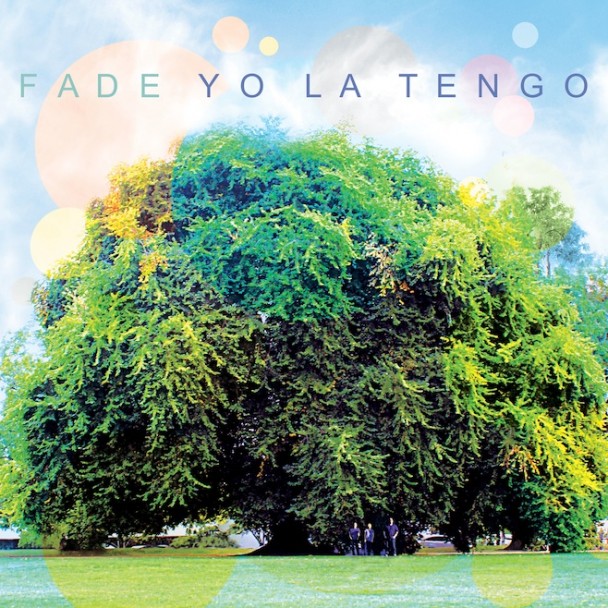Yo La Tengo have accomplished a whole lot in the past three decades or so, but their greatest achievement might be this: They've figured out how to incorporate a lot of weird things into their music (modal Glenn Branca guitar freakouts, layered metronomic krautrock rhythms, ancestral-mystic British folk close harmonies) and made them all sound as natural as breathing. Fade, the band's newest, isn't a timid record by any stretch; its songs sputter and melt and flutter and soar, all according to their own internal logic. But it's an absolutely mellow and inviting listen, probably their prettiest since And Then Nothing Turned Itself Inside-Out. I've played it for my family during dinner, for my kids while I've put them to bed, during road-trips while the rest of my family slept. It radiates personality while disappearing into the background, coloring everything around it in subtle ways. And the fact that a band that's been around this long can still make something this unguardedly gorgeous is a cause for major celebration.
Last week, Chris DeVille wrote a really good Stereogum piece about marriage-based elder-statesman indie bands Yo La Tengo and Low, about the ways that their creative partnerships can serve, in a way, as guidemaps for those of us who are just figuring out what it means to be married to somebody. And it's true, their stories offer plenty of lessons: Push each other, carve out time for yourself and your own interests, keep friends around to call you on your bullshit. But beyond the whole marriage thing, Yo La Tengo set a more nebulous example, an individual one. Consider: This is a band that's been around since 1984, and one that calls the New York metropolitan area home. They've been around for so many massive, tidal changes in the underground-music landscape that they probably lost track of them years ago, and they've seen the New York press anoint hundreds, maybe thousands, of cool new bands. They've been working steadily, doing goofy side-project things to keep themselves from getting bored, playing venues probably the same size as the ones they were playing 15 years ago. And yet they don't sound the tiniest bit jaded or bitter. If anything, Fade presents a Yo La Tengo more dizzily in love with the world and each other than ever. It's there in the way Ira Kaplan gently intones, "It happens every day / And it takes my breath away" on "Stupid Things," on the gooey extended acoustic build of "I'll Be Around," in the happy resignation of the utterly flattening opener "Ohm."
Oh man, "Ohm." This, readers, is how you start an album: A delicate bongo-ripple and a few Fender Rhodes plunks, a motorik drumbeat, a fuzzed-out and assured jangle-drone guitar part, all slowly filing in and making their presence known. And over seven minutes, the delicately warped guitar entropy slowly and steadily increases, but it never becomes chaotic; it becomes an assuring Crazy Horse roar. And throughout, Kaplan and Georgia Hubley, in harmony, calmly and sweetly sing terrifying things to each other: "This is it, for all we know / So say goodnight to me / And lose no more time / No time." They've nailed a difficult feeling here: Beatific romantic warmth in the face of the panic that comes with inevitable looming death. Not too many bands can handle that one. And if anything, the closing six-minute lull "Before We Run" is even better: A warm drone-folk shimmer, built on reverberating-heartbeat drums and leaves-tossed-in-the-breeze guitar interplay, streaked with the most perfect postrock orchestral accompaniment you ever heard in your life. It's such a wonderful musical shimmer that they just let it ride for a couple of minutes after they finish singing things to each other. The more I hear these two songs, the better they sound, and they sounded pretty fucking great the first time I heard them.
Those two songs are the album highlights, but the rest of the album lives up. On the rest of the album, they don't rip through different aesthetic ideas they way they've done on recent albums. Instead, these songs are mood-pieces, variations on the adventurous calm that those two songs perfect. "Well You Better" has a chintzy early'-60s pop sheen to it, but they nail the sound in a subtler and more assured way than they did on "Periodically Double Or Triple," from 2009's Popular Songs. "Paddle Forward" is vintage homespun early-'90s knit-cap indie noise-pop, still as blearily vital as ever. "I'll Be Around" doesn't disturb its acid-folk fingerpicking with anything as disruptive as a single drum crack. These songs never sound alike, but they don't stray too far afield either. Instead, the album melts into one blissful Sunday-afternoon still-in-bed amber-sunlight whole.
The big story behind the album, if there is one, is that Yo La Tengo decided not to work with regular producer Roger Moutenot, instead recording in Chicago with Tortoise/Sea And Cake member and postrock eminence John McEntire. And McEntire does a wonderful job; everything comes through crystalline and balanced. And in a way, it's a dream combination. Past McIntire clients like Stereolab played around with some of the same sounds and ideas that Yo La Tengo always have, but in their hands, those sounds announced themselves as something adventurous, futuristic, almost transgressive. But even when they're toying around with free jazz or kitsch-pop or inside-out psych-rock, Yo La Tengo always make those sounds feel natural, lived-in. With Fade, they've made an album that, for all its boundary-pushing, plays out like one long, contented sigh.






